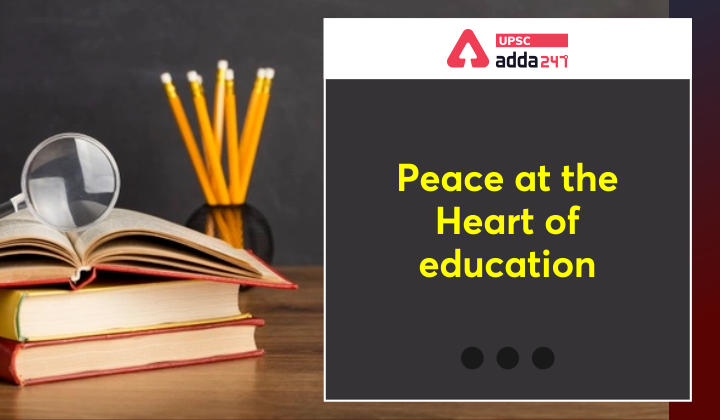Table of Contents
Peace at the Heart of Education- Relevance for UPSC Exam
- GS Paper 2: Issues relating to development and management of Social Sector/Services relating to Education.
Quote for GS Paper 4 and Essay
- “Preventing war is the work of politicians, establishing peace is the work of educationists”
– Maria Montessori (an educator)
Peace at the Heart of Education- Context
- October 2, every year is celebrated for the ideals of peace by marking the birthday of Mahatma Gandhi and the International Day of Non-Violence.
- This presents an opportunity to explore the causes of violence and reassert a commitment to building a culture of dialogue through education.
Failing on Food- Status of Malnutrition in Children and PM POSHAN Scheme
Peace at the Heart of Education- Associated Challenges
- COVID-19 Impact: It introduced new forces of division in society. For example-
- Levels of hate speech and fear of the ‘other’ have grown, as people have assigned blame for the virus.
- Forms of structural violence- the economic, racial and gendered forms of injustice built into social systems- have been exacerbated as marginalized groups, including displaced persons and racialized groups, have been disproportionately affected.
- Surge in Inequality: is driving instability and tension, fuelling potential social unrest.
- ‘Pathways for peace’, a flagship 2018 report by the World Bank and the United Nations:
- It shows that many of the world’s conflicts arise from exclusion and feelings of injustice.
Revitalising PM-KUSUM- Key Features, Implementational Challenges and Way Forward
Education of Peace in India
- Historical background: The philosophies of various religions, cultures and of Gandhi have non-violence, syncretism and tolerance at their core.
- National Education Policy (NEP), 2020: presents a unique opportunity to contribute to strengthening equity, justice, and social cohesion.
- The policy has a broad focus on value-based and experiential education, including promoting critical thinking, cultural exchanges, teaching in regional languages, and a commitment to education for all.
- It also advocates for reforms in curricula and pedagogy.
Dholavira: A City of Harappan Civilization
Peace at the Heart of Education- Way Forward
- Build Solidarity: by understanding the root causes of human animosity and make peace with one another. We must think about the structures, attitudes and skills that create and sustain peace.
- Strengthen Equity through Education: Education can impart the skills and values necessary to recognize and prevent potential conflicts and promote tolerance.
- Reforming education system:
- Equipping children from a young age with the skills to respect the dignity of others is key to building resilient and peaceful societies.
- Teachers and educators also need to be equipped with skills to promote peace through experiential and interactive methods.
- Intercultural competencies, like empathy and critical thinking, are best learned through intercultural exchanges and scenario-based learning and not rote learning.
- Focusing on Inclusion: Need to recognize and improve opportunities for disadvantaged groups, like women and girls and persons with disabilities.
The All-India Quarterly Establishment-based Employment Survey
Conclusion
- Beyond discussions around innovation, technology, and smart future schools, we need to understand the potential of education systems and schools in building peaceful societies.
- In times of crisis, education has the ability to provide hope and confidence.




 TSPSC Group 1 Question Paper 2024, Downl...
TSPSC Group 1 Question Paper 2024, Downl...
 TSPSC Group 1 Answer key 2024 Out, Downl...
TSPSC Group 1 Answer key 2024 Out, Downl...
 UPSC Prelims 2024 Question Paper, Downlo...
UPSC Prelims 2024 Question Paper, Downlo...
